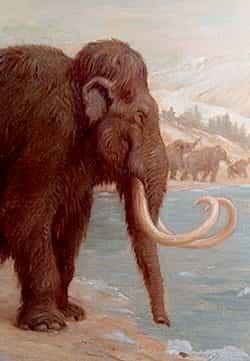The Disappearance of the Mammoth
About 100,000 years ago, mammoths—large, hairy, elephant-like creatures—roamed in herds across much of the globe. Around 11,000 years ago, mammoths suddenly became extinct, except for one last population that lived over 7,000 years longer than the rest. This last group disappeared 3,700 years ago. Why did the mammoths become extinct? To answer this question, Museum scientist Ross MacPhee went to Siberia, the last home of the mammoths. By studying fossils, he hopes to test the theory that disease may have caused their extinction. Solving this mystery is important because finding out what caused extinctions in the past may help us prevent them from happening in the future.
Pronunciation: x-TINK-shun
Name Origin: from the Latin extinctus, which means "to extinguish"
Description: Species of plants and animals are evolving every day, and many species are also disappearing, or becoming extinct. Sometimes human activity interferes with and speeds up these processes.
Significance: Extinction is permanent. There's no coming back from being extinct!


How the Passenger Pigeon Became Extinct
About 300 years ago, billions of passenger pigeons lived on Earth. When gigantic flocks of these birds migrated, they could block out sunlight for hours. When large groups of these pigeons roosted, the limbs they sat on would sometimes snap from the weight of so many birds. In the 1800s, killing these birds for food became big business. In 1869, over one billion birds were killed in Michigan alone. Heavy hunting and the destruction of its breeding habitat caused the passenger pigeon to die out. In 1914, the last known passenger pigeon (named Martha) died in a zoo. Due to direct human impact, the most abundant bird in the world became extinct in a matter of decades.
What is the greatest cause of extinction today?
overhunting
destruction of habitat
not enough exercise
Correct!
Many plants and animals can't survive when their habitat changes quickly. Human activities such as mining and cutting down forests for farming or grazing destroy habitats.
There have been five great mass extinctions in the history of life on Earth.
Fact
These five mass extinctions have had a major effect on the evolution of life.
Because of human activity, we are losing many species of animals to extinction at an alarming rate.

Mike Novacek
paleontologist




 Biodiversity
Biodiversity
 Brain
Brain
 Genetics
Genetics
 Marine BiOLogy
Marine BiOLogy
 MicrobiOLogy
MicrobiOLogy
 PaleontOLogy
PaleontOLogy
 ZoOLogy
ZoOLogy
 AnthropOLogy
AnthropOLogy
 ArchaeOLogy
ArchaeOLogy
 Astronomy
Astronomy
 Climate Change
Climate Change
 Earth
Earth
 Physics
Physics
 Water
Water
